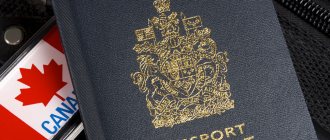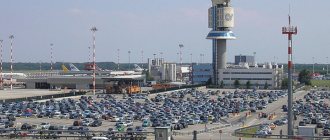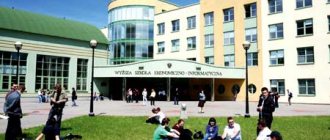general information
The Republic of Kazakhstan is one of the most prosperous countries in Central Asia. Perhaps this state, possessing huge oil reserves, access to the Caspian Sea, a cosmodrome, vast free territories and expensive minerals, turned out to be the only one in this region where the “color revolution” did not take place.
This is a multinational republic in which a huge number of people live. Today, not only Kazakhs and Russians live on the territory of Kazakhstan, but also Ukrainians, Belarusians, Greeks, Turks, Georgians, Armenians, Uighurs, Chinese, Germans and representatives of other nationalities.
Detailed map of Kazakhstan showing highways, cities and national parks
Thus, according to the population census conducted in 2021, today the following people live in Kazakhstan:
- Kazakhs – 11,245 people.
- Russians – 3,685 people.
- Uzbeks – 521 people.
- Ukrainians – 301 people.
- Uyghurs – 247 people.
- Tatars – 203 people.
- Germans – 182 people.
Natural process
Many people, especially members of the older generation, longingly remember the times when all the now former Soviet republics lived as one family. Needless to say, some patriots of the USSR still perceive with resentment the fact that some Baltic republics accepted their independence with great joy. But Kazakhstan is not the Baltic states. There is a completely different mentality here. If we do not take into account the opinions of Kazakh nationalists and other “right-wingers,” the young republic reacted calmly, almost philosophically, to gaining independence.
It is important to understand that in the eighties of the twentieth century the percentage of the Kazakh population was small - only about forty percent.
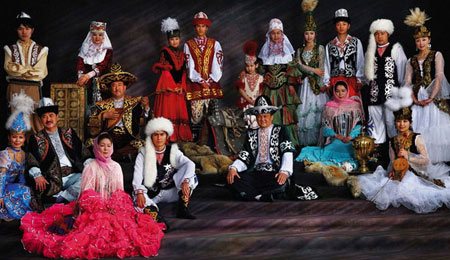
National Kazakh costumes
In 2003, after the program for the voluntary resettlement of oralmans to Kazakhstan began, the share of Kazakhs out of the total population exceeded 50 percent. This figure is constantly growing. This is especially felt in the large southern cities of Kazakhstan.
The same applies to the “brainchild” of N.A. Nazarbayev - Nur-Sultan (Astana). This city, which just fifteen years ago looked like an abandoned farm, today is a toy city that can rival even European capitals in beauty and modernity.
Today, according to statistics, 74% of Kazakhs, 16% of Russians and 7.8% of representatives of other nationalities live in Nur-Sultan.
The situation is approximately the same in the southern capital of the Republic - Almaty (formerly Alma-Ata). Today, in this million-plus city, which is rightfully considered the cultural center of Kazakhstan, 56.11% of Kazakhs and 29.67% of Russians live. The question of why Russians want to leave Kazakhstan for Russia for permanent residence worries sociologists of the Republic.
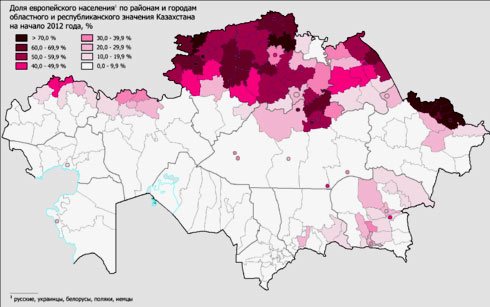
Map of the distribution of the Russian population on the territory of Kazakhstan
According to many of them, the fact that Russians are leaving Kazakhstan almost en masse is a very alarming indicator. “Fish looks for where it is deeper, but man looks for where it is better,” says a popular proverb. It is quite difficult to answer the question why Russians, who have taken deep roots in Kazakhstan, are leaving the young republic.
Obviously, the main reason is ethnic heterogeneity. The so-called oralmans are returning to Kazakhstan - ethnic Kazakhs or Kazakhstanis who, at the time Kazakhstan gained independence, did not have citizenship and now, according to the president’s program, have returned to their homeland for permanent residence. Against this background, representatives of national minorities strive to leave for their historical homeland and join their own cultural layer.
Other reasons
Other reasons why Russians leave include:
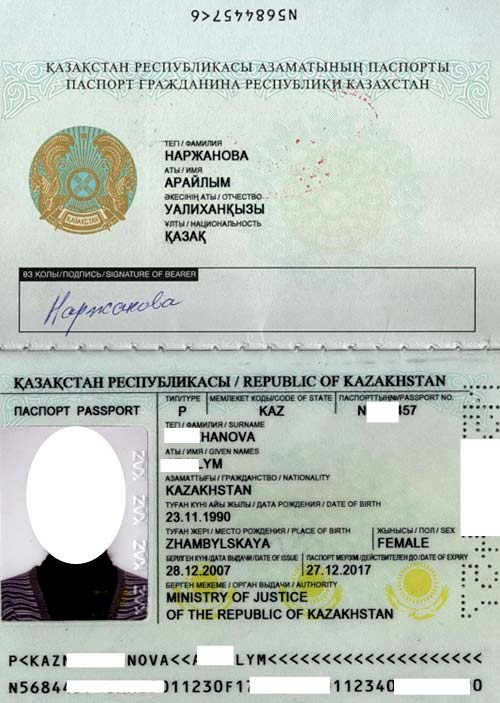
This is what a passport of a citizen of Kazakhstan looks like
- competition when applying for a job in Kazakhstan (this is also due to the ethnic factor);
- the language barrier;
- significant limitation of the Russian language.
There are two official languages in Kazakhstan: Kazakh and Russian. Office work, according to existing legislation, is conducted in two languages. Despite this, it is quite difficult for Russian-speaking graduates to get a job, since if the head of the enterprise is a representative of Kazakh nationality, then preference will be given to “our own people.”
In Almaty, where there are a huge number of foreign companies on the market, this is not yet so noticeable. But in small southern cities like Taldykorgan (formerly the village of Gavrilovka) the situation is critical. This is especially true for civil servants. The situation is complicated by the fact that at the official level there is nothing to complain about: in addition to the fact that office work is conducted in two languages, meetings and “planning meetings” are held mainly in Russian.
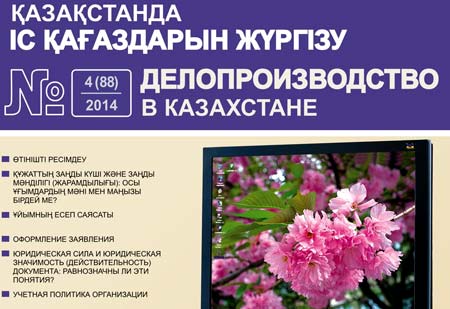
Russians are definitely being “squeezed out” from the team. Gradually, slowly and very patiently. The point, again, is in the mentality formed over many centuries.
If in the Baltic republics they prefer to directly point out that “non-citizens” have nothing to do in the state structure, then in Kazakhstan they act cautiously, with oriental cunning: the Russian will not stand it, he will leave. The leader will only have to shrug his shoulders and, having washed his hands of it, take one of the returning oralmans in his place.
Historical factor
Several decades ago, in history lessons in schools, the issue described in the novel “The Messenger” by the remarkable Soviet writer of Kazakh origin Anuar Alimzhanov was studied in detail. This question concerns the annexation, at the request of Khan Abulkhair, of the not yet fully formed Kazakh Khanate to the Russian Empire. Today, the common glorious past is often presented in a negative way.
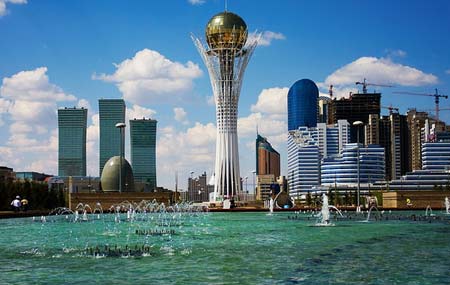
View of the new business center in the capital of Kazakhstan
Young Kazakhs are convinced that the Russian Empire “came, saw, won” and “under the guise” created by the fleeing Mongol army, annexed Kazakhstan, which wanted independence. The Russian people, who played an important role in the expulsion of the Mongols and Dzungars, who committed genocide on Kazakh lands, look like invaders and occupiers in modern history textbooks. How dangerous such trends are can be judged by the military events in Ukraine.
The recent renaming of streets also played some role. Of course, this reason cannot be called one of the answers to the question of why Russians are leaving - the fact of the renaming simply added fuel to the fire. It is impossible not to note a funny fact: with the renaming of streets, an awkward confusion began. This especially affected the transport sector.
Not everything is rosy in the cultural sphere either. In Kazakhstan, especially in Almaty, there is a real problem with the creative self-expression of modern writers.
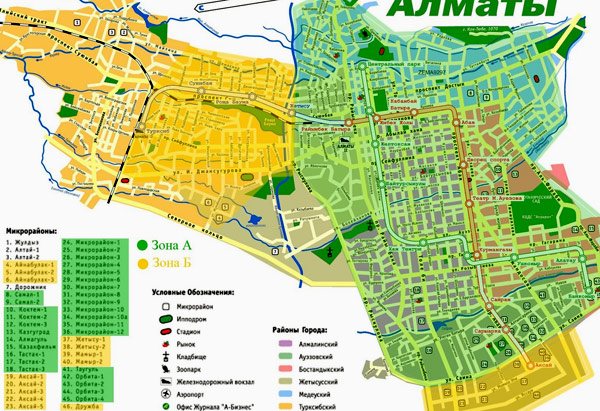
Detailed map of Almaty indicating districts and blocks
Many of them are published in Russia. Several years ago, a law was passed according to which all films, except those created by Russian film studios, will be dubbed exclusively into the Kazakh language. After even a significant part of the Kazakh youth became indignant, the solution to this issue was postponed.
National question
There seem to be no nationalists in Kazakhstan. Of course, the Kazakhs do not have such bright ideological inspirers as the notorious Bandera and Shukhevych. But in the Kazakh parliament there is a “right” faction, which is gaining more and more supporters every year.
At the everyday level, everything is quite complicated. In general, relations between Kazakhs and Russians cannot be called tense. Close friendships were formed against the backdrop of studying, working and living together in the same neighborhood. There are many mixed families in which both Kazakh and Russian traditions are equally revered.
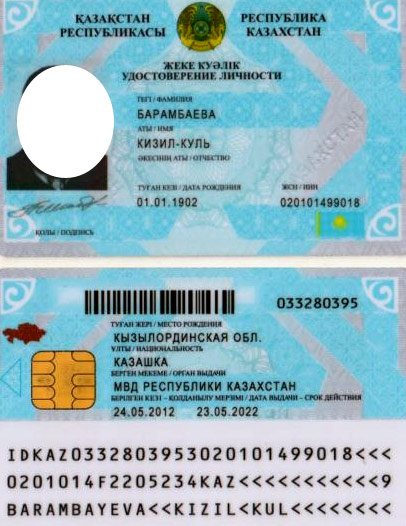
Example of an ID card in Kazakhstan
In general, Kazakhs “dislike” Tatars and Uyghurs to a greater extent. They have quite tense relations with the Chinese and representatives of Chechen nationality. Large cities are often divided into districts that are “controlled” by various nationalist groups. Several years ago in Almaty there was a case of serious conflict between Chechen and Kazakh groups.
At the everyday level, some tension is expressed in much the same way as in the case of government agencies. Russian-speaking citizens of Kazakhstan who speak Kazakh have more than once heard not very pleasant things said about them in an impersonal manner on public transport. A few years ago, a real resonance was caused by an inscription on the wall of a house in one small East Kazakhstan city. The inscription, written in a rude and categorical form, said that the Russians must immediately leave Kazakhstan.
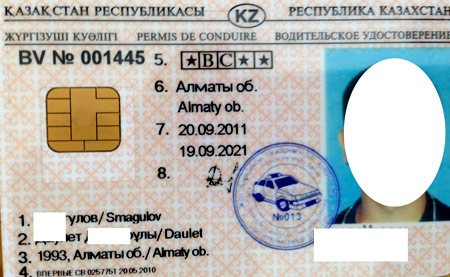
This is what a Kazakh driver's license looks like
There is also a reverse reaction. So, in Almaty in 2009-2010 there was a youth group of skinheads. Shaven-headed Russian-speaking guys aged 16-20 attacked their fellow citizens solely for national reasons.
The gradual displacement of the Russian language also plays an important role. This fact is perhaps the main answer to the question of why Russians leave, preferring the difficulties of migration to an established life in Kazakhstan. When the “language issue” was raised in Kazakhstan, one respected person hesitated and replied that many Kazakhs have a genetic dislike for the Russian language. And this is explained by the forced Russification of the Kazakhs, which took place at the dawn of the twentieth century.
Migration from Kazakhstan to Russia: how much, who and why
Marat Shibutov, July 26, 2021, 16:40 — REGNUM The topic of population migration to Russia is one of the most painful in the public discourse of Kazakhstan. The reasons for this are as follows:

Flags of Russia and Kazakhstan
© IA REGNUM
- if people leave, it means that there is a certain disproportion in social, economic and political development between Russia and Kazakhstan, not in favor of Kazakhstan;
- Mostly (70−75%) the Slavic population is leaving, which changes the ethnic picture of Kazakhstan;
- predominantly natives of the northern and eastern regions of Kazakhstan are leaving, which creates a disproportion between the overpopulated south and the increasingly deserted north;
- Ethnic Kazakhs also began to leave, which is also perceived negatively;
- Slow population growth compared to other countries in the region: Kazakhstan's population is now about 18 million, down from 16.3 million in 1991. In Uzbekistan in 1991 the population was 19 million, and now it is about 32-34 million people;
- a decline in the country’s human resources potential—mostly people with higher education are leaving, and people with, at best, a secondary education are coming to replace them.
Much less is said about the flow of people entering Kazakhstan: as a rule, these are either oralmans (Kazakhs, natives of other countries, moving to Kazakhstan under a special program), or those Kazakhstanis who did not find a job in Russia and returned. This information disproportion corresponds to the size of migration flows: six times more people travel to Russia than from Russia.
The table below presents data from the Federal State Statistics Service of the Russian Federation and the Statistics Committee of the Ministry of National Economy of Kazakhstan. As you can see, the data is very different, both because of the difference in accounting methods, and because citizens, when actually moving to another country, do not legally notify their homeland about this, sometimes even after receiving a new passport (dual citizenship is prohibited in Kazakhstan).
Kazakh-Russian migration
| Year | Arrived from Kazakhstan to Russia | Arrived from Russia to Kazakhstan | ||
| According to Russian data | According to Kazakhstan data | According to Russian data | According to Kazakhstan data | |
| 1997 | 235 903 | 216 765 | 25 364 | 22 739 |
| 1998 | 209 880 | 178 026 | 26 672 | 26 249 |
| 1999 | 138 521 | 108 115 | 25 037 | 26 719 |
| 2000 | 124 903 | 108 724 | 17 913 | 23 941 |
| 2001 | 65 226 | 94 917 | 15 186 | 23 497 |
| 2002 | 55 706 | 80 052 | 13 939 | 21 758 |
| 2003 | 29 552 | 45 451 | 14 017 | 21 565 |
| 2004 | 40 150 | 44 215 | 12 504 | 18 565 |
| 2005 | 51 945 | 38 498 | 12 437 | 15 022 |
| 2006 | 38 606 | 28 228 | 11 948 | 15 001 |
| 2007 | 40 258 | 37 704 | 10 211 | 10 966 |
| 2008 | 39 964 | 41 159 | 7 483 | 9 769 |
| 2009 | 38 830 | 30 086 | 7 232 | 8 939 |
| 2010 | 27 862 | 23 499 | 7 329 | 8 239 |
| 2011 | 36 474 | 29 850 | 6 176 | 6 629 |
| 2012 | 45 506 | 26 998 | 8 843 | 4 935 |
| 2013 | 51 958 | 20 839 | 11 802 | 4 278 |
| 2014 | 59 142 | 23 859 | 18 328 | 3 711 |
| 2015 | 65 750 | 25 682 | 30 983 | 3 905 |
| 2016 | 69 356 | — | 32 226 | — |
| Total for 1997−2015 | 1 396 136 | 1 202 667 | 283 404 | 276 427 |
But the picture of the migration balance for 1997–2015 is roughly the same:
- according to Russian data, 1.4 million people came to Russia from Kazakhstan, 283 thousand people left Russia for Kazakhstan, the migration balance is 1.1 million people;
- According to Kazakhstani data, 1.2 million people came to Russia from Kazakhstan, 276 thousand people left Russia for Kazakhstan, and the migration balance was 0.92 million people.
Data on Kazakh emigrants and immigrants, by the way, began to differ greatly since 2012, when a single labor market began operating and opportunities for living for citizens of Kazakhstan in Russia and vice versa improved.
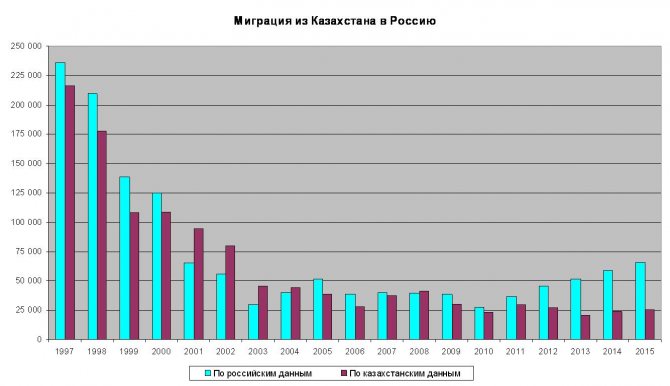
What are these volumes of migration for Kazakhstan? For example, in 1998, 209 thousand people left: for comparison, this is the population of a regional center such as Atyrau or Petropavlovsk. And 1 million with a negative migration balance is either the population of the entire capital of Astana or two regions: Atyrau and North Kazakhstan combined. That is, the values are very large.
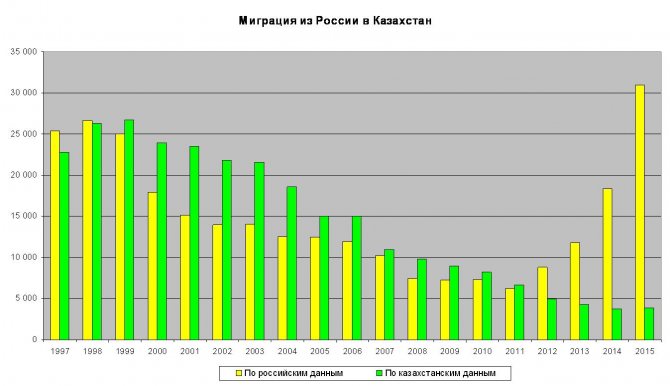
A special problem for Kazakhstan is educational migration - Kazakh youth go to Russia to study, then stay to work there, changing citizenship. Often they then transport their parents.
Let’s take the data of Russians (NRU HSE. Facts of education. Academic mobility of foreign students in Russia. Issue No. 7. July 2021): - at the beginning of the 2015/2016 academic year, 237,538 foreign students studied in Russia. Of these, 79.2% (or 188,130 students) were from the CIS countries. Of these students, 36% are from Kazakhstan. This is 67,727 people. That is, Kazakhstanis are every fourth foreign student in Russia.
At the same time, the number of Kazakh students in Russia is growing every year - in the 2010/2011 academic year there were 30,699 people or 16.4% of the total number of foreign students in Russia (Arefyev A.L. Foreign students in Russian universities. Report on 3 -th world forum of foreign graduates of Soviet and Russian universities (Moscow, November 2012).The advantage of Russian education for Kazakhstanis is higher quality and a much lower price.
There is also data from the Ministry of Internal Affairs of the Russian Federation on Kazakhstanis for 2021 (Statistical information on the migration situation in the Russian Federation for 12 months of 2021 with distribution and regions. 01/30/2017) and for January-June 2021 (Separate indicators of the migration situation in the Russian Federation for January -June 2017 with distribution by countries of the world. 07/17/2017).
| № | Indicators | 2016 | January-June 2021 |
| 1 | Registered for migration | 545 676 | 261 149 |
| 2 | Removed from migration registration | 384 921 | 180 241 |
| 3 | Registered at place of residence | 62 457 | 29 454 |
| 4 | Decisions were made to issue a temporary residence permit | 42 145 | 19 879 |
| 5 | Resides with a temporary residence permit | 64 281 | 57 728 |
| 6 | Decisions have been made to issue a residence permit | 14 239 | 6835 |
| 7 | Lives with a residence permit | 28 915 | 31 010 |
| 8 | Acquiring Russian citizenship | 37 837 | 20 188 |
As you can see, at least about 90 thousand Kazakhstanis live in Russia, having a residence permit and a temporary residence permit. Much more work is done in Russia, including seasonally.
To compare salaries, let’s take average salaries in Kazakhstan (Average monthly salary by regions of the Republic of Kazakhstan for 2010−2017), divided by the ruble exchange rate of 5.11 tenge, and average salaries by Russian regions (Average salary in 2021 by regions of Russia and other countries peace). For the analysis, data was taken from the border regions of Kazakhstan and Russia, as well as the two largest cities. In all respects, wages are higher in Russia, which, given the better social package, still creates a certain imbalance in the labor market.
Average monthly salary in 2021
| Regions of Kazakhstan | Salary, thousand rubles | Region of Russia | Salary, thousand rubles |
| Astana | 39,82 | Moscow | 66,88 |
| Almaty | 35,19 | Saint Petersburg | 45,43 |
| Aktobe region | 22,65 | Orenburg region | 26,07 |
| West-Kazakhstan region | 25,87 | Samara Region | 27,06 |
| Kostanay region | 20,50 | Chelyabinsk region | 26,62 |
| Pavlodar region | 23,87 | Omsk region | 28,82 |
| North-Kazakhstan region | 18,38 | Tyumen region | 50,16 |
| East Kazakhstan | 22,70 | Altai Republic | 24,86 |
| Country average | 27,45 | Country average | 36,20 |
In any case, Kazakhstanis will be interested in the Russian labor market: the fact is that the natural population growth of 260-270 thousand people is not accompanied by a similar increase in employment. For the last seven years, the data on the number of employed people has remained equal to 8.5 million people. The birth rate in Kazakhstan has increased since 2002, so from 2021 more young people will enter the labor market every year, but it seems there will be no jobs for them. So the Russian labor market, which has 72 million employed people, will be a salvation for many.
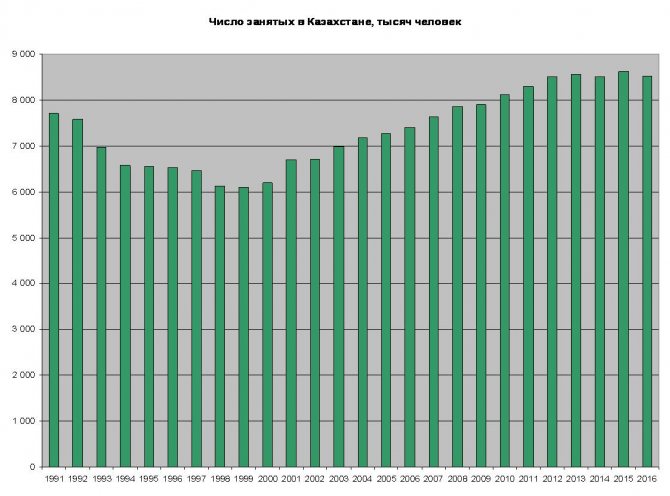
Kazakhstan and Russia find themselves in a situation similar to Canada and the United States - a large border, a difference in opportunities for the population and a single economic space. The common labor market will help regulate imbalances.
True, this market will become an opportunity only for citizens of Kazakhstan who know Russian (so far there are about 90% of them, but the situation is changing). For those who will not know it, only the labor market of Kazakhstan remains.
Where do people leave Kazakhstan?
Modern Kazakh sociologists are tormented by the question not only of “why”, but also of “where”.
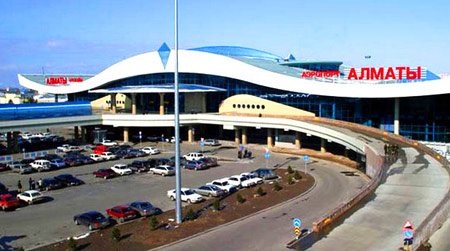
Airport building in Almaty
And if the “why” is more or less clear, then the geographic preferences of Russian-speaking citizens who have decided to emigrate from Kazakhstan are increasingly confusing. Of course, most Russians leave for Russia, Ukraine or Belarus. This is not difficult to explain, since some emigrants have relatives living there, while others have contract work. Where are the others going? The question is largely rhetorical. Where the heart calls.
At the dawn of the nineties, many people left for Germany and Israel. Some Russian speakers, unable to find employment for themselves either in Kazakhstan or in Russia, chose to leave for the United States. Many people still go to the UK and Canada. But the Scandinavian and Baltic countries are not very popular among emigrants from Kazakhstan.
What fate awaits Russians in Kazakhstan?
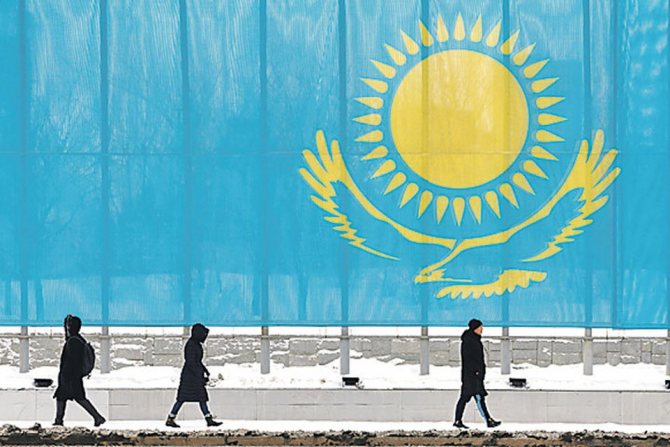
After Nazarbayev left the presidency, many began to talk about the fact that the new Kazakh authorities could speed up the de-Russification of the republic.
Photo: REUTERS
And shortly before this, in the new concept of Russian migration policy, almost for the first time, the multi-million Russian-speaking community living in neighboring countries was mentioned. Is Russia finally ready to take its compatriots home?
KP special correspondent Dmitry STESHIN, who had just returned from Kazakhstan, talked about this with one of the most competent specialists - State Duma deputy and director of the Institute of CIS Countries Konstantin ZATULIN .
— What is the current situation of Russians in Kazakhstan? Your mark.
— The bulk of the Russian population lives in the north and northeast of Kazakhstan, in cities that once bore Russian names, but have now been renamed. Guryev, for example, which became Atyrau, not to mention Tselinograd - after a series of renamings it turned into Nur-Sultan. Russians live there with ambivalent feelings. On the one hand, they know that since Kazakhstan gained independence, there have been no serious ethnic conflicts in the country. But at the everyday, grassroots level, problems are already being noted - especially with the younger generation of Kazakhs. Some young people, without hesitation, are discussing on the Internet how to expel the Russians from Kazakhstan?
Now there is a slight increase in the migration of Russians from this republic. 40 thousand people per year. It cannot be compared, of course, with the wave of the early 90s, when a million Russians and Germans left Kazakhstan. But anxiety is starting to be felt.
They now try to celebrate all holidays in Kazakhstan with national flavor. For example, Navruz - the day of the onset of spring - is celebrated with such a horse parade.
Photo: REUTERS
There are signs: the disappearance of the Russian language from banknotes, the translation of Kazakh into Latin. This is all a reflection of the changing internal politics of Kazakhstan, associated with a change in the ethnic balance in the country. When Nazarbayev began governing Kazakhstan, there were almost equal numbers of Russians and Kazakhs in the republic—6 million each. And in the 1950s, taking into account the virgin lands, there were even more Russians! Now Russians are already a national minority, there are 3.5 million of them, or about 20% of the population of Kazakhstan. But radicals still see the spread of the Russian language and the Russians themselves as a threat to Kazakh independence. Their radicalism is manifested in personnel policy, for example, where the dominance of the Kazakh ethnic group is clearly visible.
— Will the new authorities abandon the “velvet de-Russification”?
“I think the course will continue unless some external circumstances happen.” But we, in turn, will not restrain Kazakhstan. The change of power is connected with an old problem, for example, sanctions pressure on Russia, which Kazakhstan does not want to share with us at all. Despite the priority of relations with Russia, Kazakhstan is trying to pursue an independent policy. And he does not seek to get involved in any joint projects with Russia, which could worsen his relations with the West.
— Can something change the attitude in the republic towards the Russian-speaking community, for example, the introduction of the status of a second state language?
- Time is lost. This will apparently never be done again. In the 90s, Nazarbayev explored such a possibility. Including to stop the mass migration of the Russian population and strengthen relations between our countries. The migration of Russians had an adverse effect on the economy of Kazakhstan itself. But during Yeltsin’s time in Russia they were not interested in this. And then the “window of opportunity” simply closed. At the same time, Nazarbayev does not hide the fact that he loves the Russian language, sings Russian songs, and so on. But all this does not prevent him from gradually developing national Kazakhstan.
- 3.5 million people - an impressive force! Can the Russian community itself somehow resist the ongoing de-Russification?
“But there are also those who successfully assimilate. The process is not that fast. Nevertheless, assimilation continues. On the other hand, back in the 90s, Nazarbayev did everything to prevent the emergence of uncontrollable socio-political organizations and leaders. Both among the Russian and Kazakh populations. Nazarbayev wanted to be a leader for all ethnic groups in the country. Therefore, public leaders with national Russian overtones were marginalized, ousted, and forced to leave. And today the horizon is empty - there are simply no pro-Russian public figures in Kazakhstan. This void is covered by discourses about internationalism. But if the nationalism is Kazakh, everything is fine. Russians, for example, cannot be citizens of Russia and Kazakhstan at the same time. Although many would like to. But the Kazakhs can. This is guaranteed to them by the constitution of the republic, where an exception is made for Kazakh migrants.
— Is the new concept of Russian migration policy a preparation for the evacuation of Russian speakers from the former republics of the USSR?
— The new concept is not much different from the previous one. Repatriation is again not highlighted as a separate consideration. There are points there that talk about support for displaced compatriots, but in the general mass. This is a compromise document. I am concerned that the Ministry of Internal Affairs is being rebuilt very slowly. They still control entry and exit on the principle of “keep and don’t let in,” but do not consider the migration of compatriots as an important socio-economic phenomenon. For the first time last year, migration did not cover the population decline in Russia. We would like to quickly get on new tracks, but for now we are drowning in bickering...
- What to do?
— In fact, I have always been against the mass exodus of Russians from Kazakhstan and Ukraine. I have always believed that by en masse the population always protects itself. We need to pay attention to this - in a climate of depression and in anticipation of migration, the Russian population stops giving birth. In Kazakhstan, even in the most bitter years, there was an increase in the Kazakh population with a simultaneous increase in mortality and a decrease in the birth rate among Russians. Everything is interconnected. Therefore, we should not be shy - if the interests of Russians are affected, we should bring these facts up for discussion at the interstate level.
QUESTION OF THE DAY
What awaits Russians in Kazakhstan?
Nikita ISAEV, leader of the New Russia movement:
— The vector will be more pro-Western. There is a lot of symbolism in Kazakhstan, and attempts to rename Russian cities into Kazakh ones are a signal of a change in priorities and a departure from Russia. The disengagement will proceed at a faster pace—I expect an exodus of people in the next 3 to 5 years.
What awaits Russians in Kazakhstan?
Photo: Gennady BISENOV
Nikolai SVANIDZE, presenter, historian:
— The fate of the Russian-speaking population in this country depends on the relations between our two states. Nazarbayev adhered to the line on Kazakh identity, but did not offend the Russian population. If suspicions arise that Russia is laying claim to their northern regions, then relations could sharply worsen.
Konstantin BLOKHIN, expert at the Center for Security Studies of the Russian Academy of Sciences:
— Nazarbayev’s new protege demonstrates that the vector of relations with Russia remains the same. Global players understand the importance of Kazakhstan. And besides, none of the players is interested in a situation like the Ukrainian one, that is, in unrest between different groups of the population.
Semyon BAGDASAROV, director of the Center for the Study of the Middle East and Central Asia:
— Not so long ago there were approximately equal numbers of Russians and Kazakhs in this country. Now there are less than a quarter of Russian speakers. Previously, everyone wrote in Cyrillic, but now they have switched to Latin. I don't see anything good going forward. Our diplomacy sings praises to the leaders of Kazakhstan, while real problems are kept silent.
Andrey GROZIN, head of the Central Asia department of the Institute of CIS Countries:
— In the short term, there will be some stability, while the elites will actively restructure the political configuration for themselves. Tokayev, who is acting, is interested in demonstrating continuity and stability. Like all other participants in the big political game. With Nazarbayev alive, everyone will pretend to be faithful in a cube. And no matter who runs for elections, which may take place in less than a year, these two parameters - stability and continuity - will be the main message that the electorate will buy. Now there is a feeling that nothing will change for the Russians in six months.
Resettlement program
There was a lot of talk about this program at the very beginning of the 2000s, but it started only in 2007, and by 2009 it had gained momentum. Today the Russian government says that the program will be extended again.
The program for resettling compatriots in Russia is designed not only for Russians. According to its rules, representatives of any nationality can change their living conditions to more acceptable ones.
By the way, the rules of the program must be studied more than carefully, since anyone who expects to leave Shymkent for Moscow and sit on the neck of the state will be severely disappointed. The main points of the resettlement program are:
- region;
- Job;
- housing;
- citizenship.
Each of these points has its own pitfalls.
Region
It is important to consider that the program does not include Moscow, St. Petersburg and the corresponding regions.
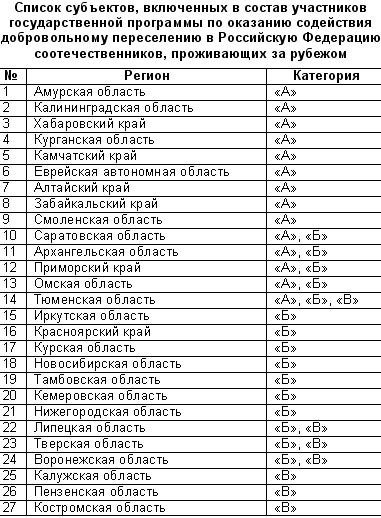
Most often, Russian “oralmans” are resettled to the following regions of the Russian Federation:
- Amur region.
- Kaliningrad region.
- Kamchatka Krai.
- Tambov Region.
- Krasnodar region.
- Voronezh region.
- Kostroma region.
- Penza region.
- Novosibirsk region.
Often the opportunity to end up in a village chills Russian Kazakhs and forces them to abandon the program and look for other ways to solve the problem.
Job
The Embassy of the Russian Federation honestly warns migrants that not everyone can count on unemployment benefits. Therefore, people who leave Kazakhstan are recommended to initially choose a region where an independent job search would not take long.
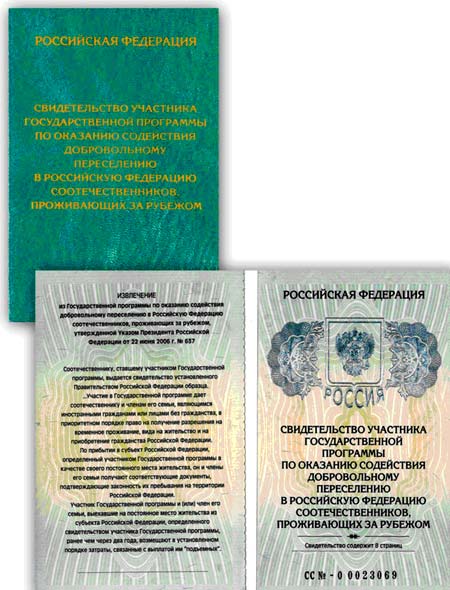
This is what a resettlement program participant’s ID looks like
Many people prefer to go to where relatives live who can provide shelter for the first time and help financially.
The program provides that all regions provide work to migrants, and there should be no problems finding it. It is important to understand that the salary will not be high, and the vacancies cannot be called enviable. There is an opportunity to get a job in a rather scarce specialty. Thus, in the regions, professionals in the educational sphere, the healthcare system, the metallurgical sector, and the gas production industry are highly valued.
There is one more important fact. Thus, according to the program, Russians who move to Russia undertake to live in the chosen region for at least two years.
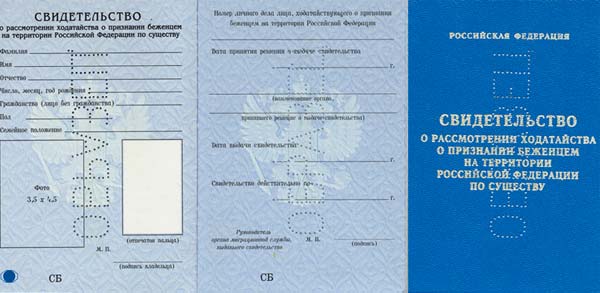
Sample of a refugee certificate in the Russian Federation
Only after this they can move to any other region.
Housing
It is important to understand that the state cannot always provide housing for migrants. The most that Russians who have left Kazakhstan can count on is a room in a family hostel. By the way, even a room is not given out everywhere. Therefore, the housing issue will have to be resolved independently.
Citizenship issue
For Russians who left Kazakhstan, there is a simplified scheme for obtaining citizenship of the Russian Federation. For some, this was the reason for the early move. According to the program, citizenship is issued within three to four months.
New in blogs
Migration statistics show that over the nine months of 2021, 25 thousand Russians left Kazakhstan. Why did our compatriots begin to leave this country en masse?
Tsargrad has already written about the boom in renaming settlements, streets and squares in Kazakhstan, where regional authorities are trying to get rid of Russian and Soviet heritage.
At the head of this process are Kazakh NGOs, local akimats and social activists who do not even hide their Western orientation. However, the idea is beginning to be supported in the higher echelons of the republican government.
Since the beginning of 2021, specialists have been presented with as many as eight variants of the new Kazakh alphabet in the Latin alphabet for study; moreover, there are proposals to translate the Russian language in the republic into Latin transcription.
Meanwhile, the ranking agency Ranking.kz published a fresh review on migration in Kazakhstan. From this document it follows that in 2019, 34.2 thousand people left the republic with an influx of population of only 8 thousand people. Most of those who left—25 thousand people—are Russians. What makes our compatriots flee Kazakhstan?
Departure boom
As Ranking.kz notes, Kazakhstan in 2021 again faced a negative balance of external migration. The balance is calculated as the difference between those who arrived and those who left, and at the end of three quarters of 2019 it amounted to minus 26.2 thousand people (a year earlier - minus 22.2 thousand people). At the same time, it follows from the review that in general the population of Kazakhstan is increasing, but this is due to the birth rate. In 2021, the population of the republic was 18.2 million people, but has now reached 18.4 million.
“On a national level, the largest number of arrivals are Kazakhs: 4.5 thousand people. Another 1.7 thousand arrivals are Russians, and 217 people are Karakalpaks. Most of the people who left were Russians (25 thousand people), as well as Germans (2.4 thousand) and Ukrainians (2.3 thousand),” the agency’s review says.
In addition, it follows from the statistics that Kazakhstan has lost mainly its most able-bodied population: 23.6 thousand of the total number of those who left are people from 16 years of age to retirement age. For example, 1.5 thousand pensioners left the republic. In return, only 6.2 thousand people of working age entered Kazakhstan.
How do they feel about this in Kazakhstan?
Indeed, if Russians are leaving the republic en masse, does that mean something? According to some Kazakhs, this suggests that they are simply unworthy of the friendship of the Kazakh people. There are opinions that Russians are divided into two categories - “good” and “bad”. The “bad” Russians leave, but the “good” Russians remain and support the renaming of Russian cities and streets. This is the paradox in Kazakh.
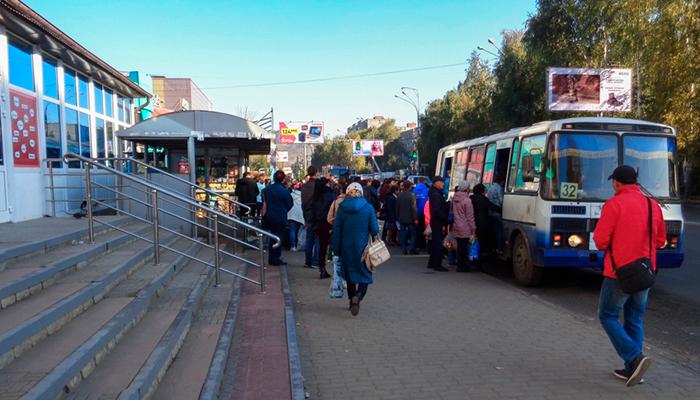
In 2021, 25 thousand Russians left Kazakhstan. Photo: Lucky Photographer / Shutterstock.com
“There have always been Russians in our country who shared the pain and suffering of the Kazakhs, as well as their joys. As were those who guarded them from watchtowers. But there were always more of the first,” Serik Maleev, editor-in-chief of the Altynord website, wrote in the “Kazakhstan News” community on Facebook, claiming that “the Russians of Kazakhstan support the renaming of Pavlodar.”
He also does not hesitate to call Russians “vatniks,” and the use of this definition clearly captures this ideology in a Russophobic vein that is already clear to us, which is known thanks to the Ukrainian authorities.
The fact that there is a split in the Russian community of Kazakhstan, and it is divided into so-called chauvinists-vatniks who oppose the independence of Kazakhstan, and Russians - patriots of their country, is an objective historical process,
- Maleev is sure.
If you read the community more carefully, the Russophobia simply catches your eye. So, for example, in another post Maleev writes that “Russia wanted to absorb Belarus by introducing it into the Russian Federation.” Moscow, he continues, “has hidden its imperial undertaking under the guise of deepening the integration of the two states.”
“But for Belarusians, their own independence turned out to be more valuable than Russian oil. Which led to a sharp cooling in relations between Belarusians and Russians,” gloats a spokesman for public opinion in Kazakhstan.
Of course, one should not generalize and say that all Kazakhs think the same way as Maleev. However, the online newspaper “Altynorda” has its own reader, and having visited the site, it is not difficult to see that the resource is simply saturated with unpleasant, politicized and provocative statements about Russia.
If you believe Maleev and his audience, then the Kazakhs will not be upset at all that the “bad” Russians, who do not agree with the renaming and attack on the Russian language, decided to leave this country.
What is the reason?
However, the real reason is not at all that Russians are allegedly divided into “vatniks” and patriots of Kazakhstan, but in the increasingly obvious oppression of everything Russian. The initiative to rename Pavlodar has caused a wide discussion, and the Kazakh authorities have already joined the issue and support this idea.
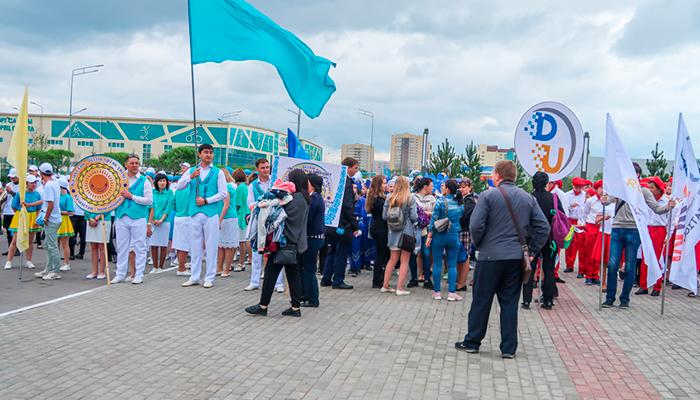
The renaming of Pavlodar has caused a wide discussion, and the authorities of Kazakhstan have already joined the issue and support this idea. Photo: kzww / Shutterstock.com
The initiative belongs to the representative of the public organization Jebe Zhumabek Smanov, who put forward it at a meeting with Mazhilis deputy Aizada Kurmanova. It is proposed to rename Pavlodar to Ertis. It is noteworthy that the initiative was suddenly (or not so much) supported by Kurmanova, as well as a large number of local officials, journalists and public figures.
In Pavlodar, by decision of local authorities, 13 streets have already been renamed, including the one that previously bore the name of Mikhail Kutuzov. This process is also underway in the East Kazakhstan region, where renaming affected several hundred streets, villages, and the regional center of Zyryanovsk. It is known that local akim Danial Akhmetov declared war on Russian names there.
At the same time, one cannot help but recall that Pavlodar as a settlement has existed since the 16th century, when it was founded by Russian settlers in the Irtysh region. In 1861, the city was named Pavlodar in honor of the newborn Grand Duke Pavel Alexandrovich. But the Kazakhs prefer to forget about who founded the city and how, and to “comb” the process of renaming streets under “decommunization,” which, in an amicable way, has nothing to do with the Russian Empire. This leads to another conclusion: the initiators of the renaming of Pavlodar, as well as the masses of other settlements, streets and squares, do not care about all this. It is important that there is no Russian.
It is impossible not to say that Kazakhstan today gives the impression of a state that cannot understand itself and its history. Eight variants of the “Latin” Kazakh alphabet at once is a lot. Well, if the transition to the Latin alphabet takes place, then this will mean the need to again teach the population to read, learn the alphabet, and in addition, translate all literature into a new language. But what about schoolchildren who started studying in Cyrillic and will have to finish in Latin?
In addition, the initiative of the former President of the country Nursultan Nazarbayev, put forward by him six years ago, is known. He proposed renaming... no, not the city, but the whole country. Kazakhs should abandon the word “Kazakhstan,” Nazarbayev believed, and in January 2021 he was supported by deputies of the Kazakh Majilis, who continue to discuss this idea.
What about the story?
Finally, one may get the impression that Kazakhstan is now following the path of Ukraine. And it’s not just about de-Russification, but also about trying to come up with your own history. Thus, Doctor of Philosophy and former associate professor of Al-Farabi Kazakh National University B.K. Beisenov stated that Adam was actually a Kazakh.
The Kazakh writer and historian Mukhambetkarim Kozhyrbayuly argued that Ancient Rome was founded by the Kazakhs. Homer, the author of the Iliad and the Odyssey, according to the historian, was an ethnic Kazakh. Ancient Greece was also founded by Kazakh migrants, since the name “Hellas” supposedly comes from the Kazakh “El ata” (Country of the Fathers), and the Hellenes are called so from the Kazakh “el” - “country”.
“The state structure of the Roman Empire was created in accordance with the tribal system of the Kazakh Khaganate. For example, in the Roman Republic, special power was vested in the Senate - the Council of Elders. The Kazakhs have three zhuz, and the Romans also divided the people into three categories: curia, centuriate and tribe,” says Kozhyrbayuly.
There are a lot of similar examples when certain historians and scientists write a new history of their people. However, it is also indisputable that since the beginning of the 19th century, thanks to Russian participation, Kazakh poetry, orchestras of national Kazakh music, and folk dances staged by Russian choreographers appeared.
And the Kazakhs themselves only became a single people at the beginning of the 20th century, whereas before that they had no statehood and were a number of warring nomadic tribes. At the same time, the Russians began to call people living on the territory of modern Kazakhstan Kazakhs, although previously they were called Kyrgyz. The Bolsheviks gave Kazakhstan most of the Russian land in Southwestern Siberia, and the Kazakh SSR was founded in 1936. In 1954, Nikita Khrushchev gave the Kazakhs seven more Russian regions. The same ones from where modern Kazakhs intend to uproot everything Russian.

It is also indisputable that since the beginning of the 19th century, thanks to Russian participation, Kazakh poetry, orchestras of national Kazakh music, and folk dances staged by Russian choreographers appeared. Photo: Vera Larina / Shutterstock.com
To summarize, let’s say: it turns out that the Kazakhs are eradicating not only everything Russian, but also the Russians themselves from this land. It is not surprising that a number of our compatriots do not agree with this and are not ready to put up with people exclaiming that the “vatniks” can go home. This is a process that is unpleasant for both - Russians and Kazakhs. The fraternal people, who have a great common history, who had one large common country in the past, should not divide the Russians and declare war on present history.
Non-returnable emigrants of Kazakhstan: minus 366 thousand people over 10 years
The Bureau of National Statistics of Kazakhstan reported an increase in the country's population by 245 thousand people per year. Meanwhile, migration from Kazakhstan continues to increase. Over the past ten years, over 366 thousand people have left the country irrevocably. The majority are able-bodied, educated, with qualifications and capital. A large detailed material about this problem was prepared by a journalist from Ust-Kamenogorsk Irina Osipova, Petropavlovsk.news reports.
The history of independent Kazakhstan includes several large migration waves. Each of them is associated with some kind of economic recession, be it the 90s and 2000s, when more than 2.2 million people left the country (data from the statistical collection “We, Kazakhstan” by the Bureau of National Statistics of the Republic of Kazakhstan) or the global crisis of 2008-2009 years, which affected the macroeconomic situation of the state.
A new rise in migration outflow began in 2014, which was remembered for the devaluation of the national currency and the reorganization of the government. Data from the BNS of Kazakhstan show an increase in the number of emigrants since 2014 by 8-16% annually. If in 2015 30 thousand citizens left the country, then at the end of 2021 the figure increased by 30% and amounted to 45.2 thousand people. This is the highest figure in the last ten years.
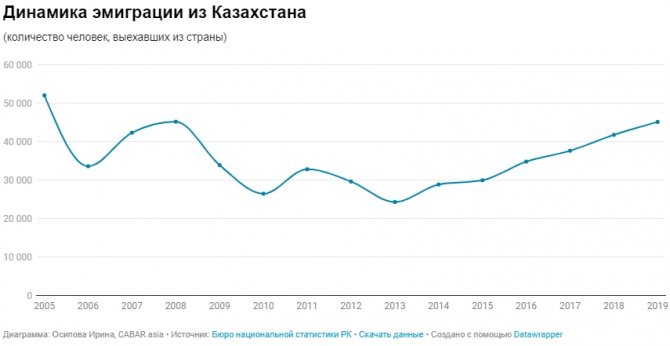
Statistics on external permanent migration from Kazakhstan in 2021 show a significant reduction in the number of those leaving. According to the Eurasian Economic Commission (EEC), for January-September 2020 - only 21 thousand people - this is 61% of the same period last year.
It is believed that the coronavirus pandemic could have caused delayed migration. People who wanted to leave were simply unable to do so due to closed borders. But it will be possible to confirm or refute this opinion only after the borders open.
Migration processes are also typical for other countries of the Eurasian Economic Union. But, according to data from EEC analysts published in the EAEU Statistical Yearbook, Kazakhstan has the largest negative migration balance. This means that many more people are leaving the country than are arriving.
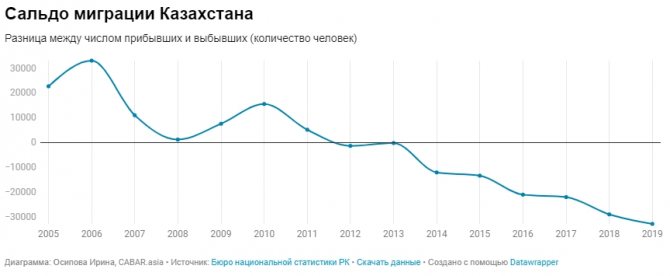
Who's leaving?
A portrait of an average family moving from Kazakhstan can be drawn using data from the statistical bulletin “Migration of the Population of the Republic of Kazakhstan” of the Bureau of National Statistics for 2021. It provides information about emigrants broken down by ethnic group, age, and nationality.
Thus, of the 45.2 thousand who left Kazakhstan in 2021, 72% are Russians, 7% are Germans, 6% are Ukrainians, 4.8% are Kazakhs. The overwhelming majority of emigrants are urban residents (84%) aged 16 to 62 (70%).
Ranking by level of education shows that mainly people with higher or secondary specialized education migrate from Kazakhstan (70% of people over 15 years of age). Specialists from the Bureau of National Statistics of the Republic of Kazakhstan also provide a breakdown by profession of emigrants. The largest share of Kazakhstanis with higher education who left the country in 2021 were specialists in technical professions (more than 7.1 thousand), as well as citizens with economic (3.7 thousand) and pedagogical (2.3 thousand) education. Many of the emigrants are lawyers, health workers, architects, and builders.
Where are they leaving from?
If you look at the regional structure, you can trace trends. The ethnic migration of the Slavs is determined by their settlement in the northeastern regions of the country. Therefore, the largest number of ethnic Russians leaving is recorded in the East Kazakhstan, Karaganda, Pavlodar, and Kostanay regions.
Kazakhs leave for other countries for permanent residence from the most urbanized, developed territories - Almaty region, Nur-Sultan, East Kazakhstan, Mangystau and Kostanay regions.
Where are they going?
In the ranking of receiving countries, compiled on the basis of official statistics, Russia takes the lead - 88% of Kazakh emigrants move there. Data analysis shows that the Russian Federation is becoming a new homeland specifically for Kazakhstanis of Slavic nationalities from the northern and eastern regions of the country.
Germany is in second place among the receiving countries; Germans and Russians go there. A share of 1% is occupied by Uzbekistan, where Kazakhstanis from the southern regions of the republic (Turkestan, Zhambyl regions, Almaty, Shymkent) leave in search of a better life.
Why are they leaving?
Official data does not provide a clear answer to this question. In the gradation of reasons for leaving in research by the Bureau of National Statistics, only three goals are declared: “in connection with work” (10.5%), “in connection with study” (0.8%) and “other” (88.7%). What exactly is this “other”, we asked the experts.
Specialists of the International Organization for Migration (IOM) in Kazakhstan and Central Asia, in response to a request from CABAR.asia, note that the main factor influencing the decision to migrate is the economic aspect.
“People migrate in search of higher wages and better living conditions. This is a global trend, and Kazakhstan is no exception. Why is Russia most often chosen as a country for labor migration? This is facilitated by geographical proximity, the absence of a language barrier, a visa-free regime and a free labor market within the EAEU,” says the IOM response.
In 2021, experts from the IOM regional office in Central Asia conducted a large study on external youth migration from the countries of the region. Among the reasons for migration, political factors took first place: corruption in all spheres, uncertainty in the future due to unclear government policies, weak civil society and others. Economic factors include the low level of development of the country, weak economy, stagnation, and low wages.
Among the methodological tools, an online survey was used of young people who left for another country for education or employment at least six months ago.
Alexander Repin is originally from Ust-Kamenogorsk, but migrated to Russia with his family and now works as a senior manager of the quality department in Kaliningrad.
“Children in Kazakhstan have few prospects of finding a good job, and, as a result, getting a decent standard of living. We approached the move consciously and purposefully. The difficulties that I had to face are already forgotten and I don’t even want to visit Kazakhstan. Of course, Russia is not ideal either, there are many problems, but in comparison with Kazakhstan the difference is huge,” he says.
The family of primary school teacher Anastasia Semenova moved two years ago from the city of Altai in the East Kazakhstan region to Yekaterinburg. According to the woman, several reasons prompted them to make this decision.
Firstly, the quality of Kazakhstan’s education. The updated system did not suit her either as a parent or as a teacher. Secondly, low wages. In Yekaterinburg she earns significantly more for the same position than in Kazakhstan. But such salaries, according to Anastasia Semenova, are not everywhere in Russia - it all depends on the city and specialty.
For the Vorobyov family, who moved from the East Kazakhstan region to Novosibirsk, the unsatisfactory quality of education became one of the most important reasons for moving.
“We had been thinking about moving before, but when our daughter entered first grade, we looked at the program and... began collecting documents for the move,” says the father of the family, Artem Vorobyov. – The second reason is the lack of future prospects for us. They were egged on by these endless fines, corruption, and bureaucracy. I was not happy with the bad environment. Here, many of our ailments and allergies went away on their own. Did we get what we expected? Definitely yes. We were paid allowances, maternity capital, and offered training and employment. Our move was not easy, there was a lot of paperwork, a lot of money and nerves, but it was worth it.”
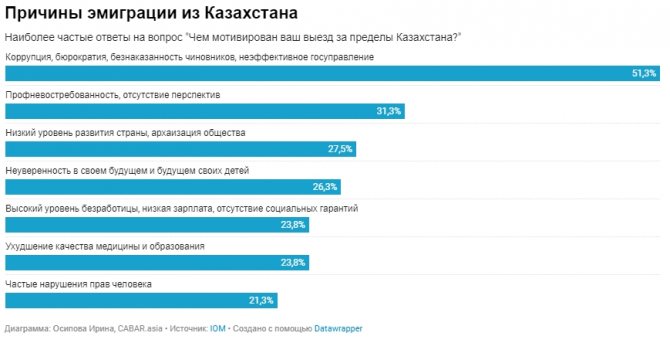
Olga Simakova, project coordinator of the Kazakh public foundation “Center for Social and Political Research “Strategy”, has been researching the features of migration processes in Kazakhstan for many years. An in-depth analysis of the problem reveals new trends.
“At first, everyone said that migration from Kazakhstan has an ethnic basis, that mainly Slavs are leaving here, and factors such as ignorance of the state language or discomfort in the everyday sphere, discrimination on cultural and linguistic grounds were automatically put forward as reasons for leaving. But after the Kazakhs began to leave, we asked ourselves: is language always to blame for the fact that a person leaves? A different picture is already observed - the reason is socio-economic factors and issues of self-realization,” notes Simakova.

Statistics confirm that the share of Kazakhs in the total emigration is small, but tends to grow. Representatives of the titular nation are leaving for Russia (63% of the total number of Kazakh emigrants in 2021), Uzbekistan (8%), Germany (6%), the USA (5%) and other countries.
“When a person, having qualifications, higher education, applying for a well-paid job, does not find it in the structure of the economy that we have, he looks for opportunities to realize himself somewhere else. We live in an open space and can compare. […] For many professionals in Kazakhstan, there is a “glass ceiling” factor that they hit, despite their high qualifications,” notes Olga Simakova.
On the French side, on an alien planet...
Another significant trend in issues of interethnic movement of youth is educational migration. The problem of the annual outflow of thousands of Kazakh applicants to foreign universities is discussed at the level of the government of Kazakhstan. This is not the first year that the authorities have been taking various measures to improve the quality of education in national universities, the number of grants, etc.
According to the EEC statistical collection “Education in Figures”, in 2019-2020, 63 thousand Kazakhstanis studied at Russian universities. And taking into account the fact that there are only 605 thousand university students in Kazakhstan, it turns out that every tenth Kazakh student receives higher education abroad. Within the EAEU, Kazakhstan holds a 67% share in the total volume of “exports” of students.
An approximate calculation, which was made by analysts of the regional office of the International Organization for Migration in Kazakhstan and Central Asia, suggests that “the potential for non-return migration of young people who left the countries of the region for work or study can be estimated at 30-35% with a tendency to growth." That is, about 20 thousand Kazakh students studying abroad may subsequently renounce their citizenship of the Republic of Kazakhstan.
“Educational migration is considered by a significant part of young citizens of Central Asian states as a springboard for subsequent emigration from the country. It is assumed that educational programs are aimed at improving the skills of young people within their home countries so that they invest in the development of the national economy. However, having received education and experience living in other countries, educational migrants, returning to their homeland, again focus on migration, but with the goal of working abroad or staying there permanently,” says a study by experts from the IOM regional office.
According to Olga Simakova, ethnic differences must also be taken into account in educational migration trends. Slavic families in Kazakhstan who send their children to study at foreign universities are guided by push standards - for their son or daughter to receive an education, apply for citizenship, and find a job there. Parents of Kazakh students believe that there is better education abroad, but young people are told that they should return and be close to their family and build a career here.
About forecasts and more...
In 2021, specialists from the United Nations Population Fund in Kazakhstan (UNFPA), with the support of the Bureau of National Statistics of the Republic of Kazakhstan, prepared an analytical report on the situation in the field of population in the Republic of Kazakhstan. It contains forecasts for external migration of Kazakhstan until 2050 in a separate section.
“The main hypothesis when developing international migration scenarios was that the outflow of the population of Kazakhstan will decrease over time. This will be influenced by: the economic development of the republic, accompanied by high demand for labor, the gradual exhaustion of the potential for significant ethnic migration and rapid population growth in the neighboring southern republics (which are the homeland of immigrants from Central Asian countries to Kazakhstan - author’s note),” the experts concluded UNFPA.
Olga Simakova, project coordinator of the Center for Social and Political Research “Strategy”, agrees with the forecasts of a decrease in the migration flow among the Slavs of Kazakhstan in the future. According to the expert, the reasons are closely related to demographics.
“Russians have a lower birth rate - on average there are one or two children in a family. And if we take into account the strategy of pushing out to Russia, which exists among parents of older schoolchildren, we can predict that over time there will be fewer young people of Slavic nationality in Kazakhstan. In the medium term, representatives of the older generation – the parents of those same students – will begin to leave the country,” said Olga Simakova.
In the spring of this year, the PF “CSPI “Strategy” conducted a survey among Kazakhstanis on their migration intentions. Respondents were asked the question “If you had the opportunity to change your place of residence, where would you move?” The answers varied depending on the nationality of the respondents. More than half of those surveyed do not want to move anywhere. 28.3% of respondents among ethnic Russians and 10.7% among ethnic Kazakhs stated their desire to leave Kazakhstan.

Olga Simakova notes that according to the theory of demography, there can be an arbitrarily long time period between intention and decision. Many factors influence the outcome.
“Those people who have plans to move have a somewhat blurred idea of the future and their prospects. When they are not there, nervousness and uncertainty arise, this puts pressure, forces us to consider options for relocation. Migration is normal, there is no need to perceive it as something terrible. Changing your place of residence is the basic right to freedom of movement of a person,” says Simakova.
She notes that the consequences of emigration for the donor country do not always need to be considered in quantitative terms. For Kazakhstan with a population of 18 million people, the loss of 32 thousand people per year (balance of migration in 2021 - author’s note) does not significantly affect the natural population growth. Another thing is the qualitative composition of the emigrants. The departure of able-bodied young professionals with children is a loss for the state. And to retain them, systemic changes are needed in the economy, social sphere, and education.
Irina Osipova, journalist, Ust-Kamenogorsk, Kazakhstan.


